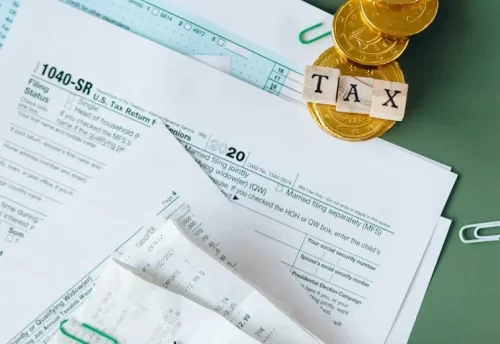
- December 12, 2023
- adarsh
- 0 Comments
- 492 Views
- 0 Likes
- Companies Act 2013
TDS on Contractors and Sub Contractors
In recent days there r common question and confusions regarding section 194C. So I am presenting the article from my side to get rid out of all the confusions regarding Contract, Rates of TDS, and Liability where tax is arise etc.
Deduction of tax at source from payments to contractors or sub-contractors [Sec. 194C]
The provisions of section 194C are given below –
Who is responsible for tax deduction – Any person responsible for paying any sum to any resident contractor for carrying out any work (including supply of labour for carrying out any work) in pursuance of a contract between a specified person and the resident contractor is required to deduct tax at source.
Specified person– Meaning of – Tax is deductible under section 194C (1) only if payment is made in pursuance of a contract between a specified person and a resident contractor. The following are “specified persons” for this purpose:
a. the Central Government or any State Government ; or
b. any local authority ; or
c. any corporation established by or under a Central, State or Provincial Act; or d any company
d. any co-operative society ; or
e. any authority constituted in India by or under any law, engaged either for the purpose of dealing with and satisfying the need for housing accommodation or for the purpose of planning, development or improvement of cities, towns and villages, or for both ; or
f. any society registered under the Societies Registration Act, 1860 or under any law corresponding to that Act in force in any part of India ; or
g. any trust; or
h. any University established or incorporated by or under a Central, State or Provincial Act and an institution declared to be a University under section 3 of the University Grants Commission Act, 1956 ; or
i. any foreign Government or a foreign enterprise or any association or body established outside India (applicable from October 1, 2009); or
j. any firm; or
k. any individual or HUF whose books of account are required to be audited under section 44AB(a)/(171 during the immediately preceding financial year and sum credited/paid is not exclusively for personal purposes; or
l. (with effect from June 1, 2008) AOP/BOI whose books of account are required to be audited under section 44AB (a) (b) during the immediately preceding financial year.
When tax has to be deducted at source -Taxis to be deducted either at the time of credit of such sum to the account of the payee, or at the time of payment thereof in cash or by issue of cheque or by any other mode, whichever is earlier. For this purpose, any sum credited to any account, whether called “Suspense account” or by any other name in the books of account of the payer, is treated as credit of such income to the account of the payee. Accordingly, tax has to be deducted if amount payable to resident contractor or sub-contractor is transferred to a “Suspense account” by the payer in his books of account.
When no tax is deductible – The provisions are given below—
· Provisions applicable from October I, 2004 – In insignificant cases – Tax is required to be deducted at source where the amount credited or paid to a contractor or sub-contractor exceeds Rs. 30,000 (Rs. 20,000 up to June 30, 2010) in a single payment or Rs. 75,000 (Rs. 50,000 up to June 30, 2010) in the aggregate during a financial year. In other words, tax shall not be deductible under section 194C if the following two conditions are satisfied—
a. the amount of any (single) sum credited or paid (or likely to be credited or paid) to the contractor or sub-contractor does not exceed Rs. 30,000 (Rs. 20,000 up to June 30, 2010); and
b. The aggregate of the amounts of such sums credited or paid (or likely to be credited or paid) during the financial year does not exceed Rs. 75,000 (Rs. 50,000 up to June 30, 2010).
· Payment or credit to transport operator (applicable from October 1, 2009) – If recipient is a transport contractor (maybe an individual, firm, company or any
Other person) and he or it furnishes his PAN to the detector, tax is not deductible with effect from October 1, 2009. For this purpose, transport operator is a person, who is in the business of plying, hiring or leasing goods carriages. Deductions who make payments to transporters without deducting TDS (as they have quoted PAN) will be required to intimate these PAN details to the Income-tax Department in the prescribed format.
· Personal purposes – Payment by an individual or HUF to a resident contractor for personal purposes is not subject to tax deduction even after the amendment of section 194C (1) from June 1, 2007.
· Small transport sub-contractor (applicable during June 1, 2005 and September 30, 2009) – Tax is not deductible at source under section 194C during June 1, 2005 and September 30, 2009 if the following conditions are satisfied-
1. Consideration for work contract is paid or payable by a resident contractor to a resident sub-contractor.
2. The resident sub-contractor is an individual.
3. The aforesaid amount is paid or payable to the sub-contractor during the course of business of plying, hiring or leasing goods carriages.
4. The resident sub-contractor does not own more than two goods carriages at any time during the previous year.
5. The resident sub-contractor submits a declaration to the payer in Form No. 15-I.
If the above conditions are satisfied, the payer (i.e., resident contractor) will not deduct tax at source under section 194C. The payer shall furnish the details of above payment to the prescribed income-tax authority in Form No. 15J on or before June 30 after the expiry of the financial year.
Who is a contractor/sub-contractor – In order to reduce the scope for disputes regarding classification of contract as sub-contract, the same rate of TDS has been specified (with effect from October 1, 2009) for payments to both contractors as well as sub-contractors.
Meaning of work contract – Provisions of section 194C relating to tax deduction from payment to contractors/sub-contractors are applicable only where contract is either a “work contract” or a “contract for supply of labour for works contract”. These provisions are, therefore, not applicable for payments made under contract for sale of goods.
‘Work” as defined in section 194C- The expression “work”, shall include (a) advertising, (b) broadcasting and telecasting including production of programmes for such broadcasting or telecasting, (c) carriage of goods and passengers by any mode of transport other than by railway, and (d) catering.
With effect from October 1, 2009, the expression “work” shall also include manufacturing or supplying a „product according to the requirement or specification of a customer by using material purchased from such atstomer. However, it will not include manufacturing or supplying a product according to the requirement a- specification of a customer by using material purchased from a person, other than such customer.
TDS rates – With effect from October 1, 2009, the following TDS rate will be applicable under section 194C-
If the recipient is an individual/HUF 1%
If the recipient is any other person 2%
OTHER POINTS – The following points should be noted—
1. There is no surcharge, education cess or secondary and higher education cess under section 194C during the financial year 2013-14.
2. If the recipient is a transport operator (i.e., in the business of plying, hiring or leasing goods carriages) and he furnishes his PAN to the payer, TDS rate is nil with effect from October 1, 2009. If PAN is not furnished, then tax will be deductible at the rate of 1 per cent (if the recipient is individual/HUF) or 2 per cent (if the recipient is any other person) during October 1, 2009 and March 31, 2010 and at the rate of 20 per cent from April 1, 2010 onwards.
3. If the recipient does not furnish his PAN to the detector, tax will be deducted (with effect from April 1, 2010) at the rate of 20 per cent. PAN of the deductee should be mentioned in any correspondence and document which is exchanged between the deductor and deductee.
4. In the case of work contract being manufacturing or supplying product according to the specification of customer (by using material purchased from such customer), TDS shall be deducted on the invoice value excluding the value of material purchased from such customer, if such value is mentioned separately in the invoice. Where the material component has not been separately mentioned in the invoice, TDS shall be deducted on the whole of the invoice value.
Tax is deductible on the entire consideration including service tax, if any.
Clarifications from the Board – The Board has issued the following clarifications on section I94C:
ADVERTISING CONTRACT– If an advertising agency gives a consolidated bill (including charges for art work and other related jobs as well as payment to media) the deduction will have to be made under section 194C. The advertising agencies shall have to deduct tax at source at the rate of 10 per cent under section 1943 while making payments to artists, actors, models, etc.—Circular No. 715, dated August 8, 1995.
· Payment directly to print media/Doordarshan for release to advertisements – The payments made directly to print and electronic media would be covered under section 194C as these are in the nature of payments for purposes of advertising. It may, however, be noted that the payments made directly to Doordarshan may not be subjected to tax deduction as Doordarshan, being a Government agency, is not liable to income-tax— Circular No. 715, dated August 8, 1995.
· Payment by an advertising agency to print media/electronic media- It is not subject to tax deduction under section 194C—Circular No. 717, dated August 14, 1995.
· Sponsorship of debates is advertisements – The agreement of sponsorship of debates, seminars and other functions in schools/colleges/associations is in essence an agreement for carrying out a work of advertisement. Therefore, provisions of section 194C shall apply—Circular No. 715, dated August 8, 1995.
· Advertisement in souvenirs- Tax has to be deducted on payments for cost of advertisements issued in the souvenirs brought out by various organisations—Circular No. 715, dated August 8, 1995.
· Payment of putting up a hoarding – The contract for putting up a hoarding is in the nature of advertising contract and provisions of section 194C would be applicable. If, however, a person has taken a particular space on rent and thereafter sublets the same fully or in part for putting up a hoarding, he would be liable to tax deduction under section 194-I and not 194C—Circular No. 715, dated August 8, 1995.
BROADCASTING/TELECASTING CONTRACTS – Once there is a specific provision introduced by wa% of an Explanation to section 194C, to bring within its ambit contractual work concerning ‘broadcasting ace.: telecasting’, the revenue cannot resort to section 194J, which is in more general terms for purpose of tia deduction at source from income from such contractual work—CIT vs. Prasar
Bharati (Broadcasting Corpc of India) [2007] 158 Taxman 470/292 ITR 580 (Delhi).
· Payment made by a cable operator to get license of TV channels is payment for a work contract pertainnig telecasting rights and covered by section 194C—Kurukshetra Darpans (P.) Ltd v. C/T [2008] 169 Taxman 504 (Punj. & Har.).
· PAYMENT MADE TO TRAVEL AGENT/OR AN AIRLINE – The payments made to a travel agent or an airline for purchase of a ticket for travel would not be subject to tax deduction at source as the privity of the contract is between the individual passenger and the airline/travel agent, notwithstan4ing the fact that the payment is made by an entity mentioned in section 194C (1). The provision of section 144C shall. However, apply when a plane or a bus or any other mode of transport is chartered by one of the entities mentioned in section 194C—Circular No. 715, dated August 8, 1995.
· The above provision shall apply mutatis mutandis to the tickets for travel of individuals by any other mode of transport also—Circular No. 713, dated August 2, 1995.
· Payment to clearing/forwarding agents vis-a-vis payment to travel agents – Payments to clearing and forwarding agents for carriage of goods is subject to tax deduction at source under section 194C. The travel agent, issuing tickets on behalf of the airlines for travel of individual passengers, would not be required to deduct tax at source as he acts on behalf of the airlines. The position of clearing and forwarding agents is different. They act as independent contractors. Any payment made to them would, hence, be liable for deduction of tax at source. They would also be liable to deduct tax at source while making payments for carriage of goods—Circular No. 715, dated August 8, 1995.
· Payment made for carriage of documents- The carriage of documents, letters, etc., is in the nature of carriage of goods and, therefore, provisions of section 194C would be attracted in respect of payments made to the couriers—Circular No. 715, dated August 8, 1995.
· Whether each GR is a separate contract – Normally, each GR can be said to be a separate contract, if the goods are transported at one time. But if the goods are transported continuously in pursuance of a contract for a specific period or quantity, each GR will not be a separate contract and all GRs relating to that period or quantity will be aggregated for the purpose of the tax deduction—Circular No. 715, dated August 8, 1995.
· Non-resident shipping companies – Section 172 is a self-contained code for the levy and recovery of the tax, ship-wise, and journey-wise, and requires the filing of the return within a maximum time of thirty days from the date of departure of the ship.
The provisions of section 172 are to apply, notwithstanding anything contained in other provisions of the Act. Therefore, in such cases, the provisions of sections 194C and 195 relating to tax deduction at source are not applicable. The recovery of tax is to be regulated, for a voyage undertaken from any port in India by a ship under the provisions of section 172.
Section 194C deals with work contracts including carriage of goods and passengers by any mode of transport other than railways. This section applies to payments made by a person referred to in clauses (a) to (I) of subsection (1) to any “resident” (termed as contractor). It is clear from the section that the area of operation of TDS is confined to payments made to any “resident”. On the other hand, section 172 operates in the area of computation of profits from shipping business of non-residents. Thus, there is no overlapping in the areas of operation of these sections.
There would, however, be cases where payments are made to shipping agents of non-resident ship-owners or charterer for carriage of passengers, etc., shipped at a port in India. Since, the agent acts on behalf of the non- resident ship-owner or charterer, he steps into the shoes of the principal. Accordingly, provisions of section 172 shall apply and those of sections 194C and 195 will not apply—Circular No. 723, dated September 19, 1995.
“Goods received on “freight to pay basis”- Payment of freight would be subject to tax deduction even when goods are received on “freight to pay basis”—Circular No. 715, dated August 8, 1995.
DOES CATERING INCLUDE SERVING FOODS IN RESTAURANT- Tax deduction at source is not required to be made when payment is made for serving food in a restaurant in the normal course of running of the restaurant/café Circular No. 715, dated August 8, 1995.
PAYMENT TO AN ELECTRICIAN- The payments made to an electrician or to a contractor who provides the service of an electrician will be in the nature of payment made in pursuance of a contract for carrying out any work. Accordingly, provisions of section 194C will apply in such cases Circular No. 715, dated August 8, 1995.
MAINTENANCE CONTRACTS – Routine, normal maintenance contracts which include supply of spares will be covered under section 194C. However, where technical services are rendered, the provisions of section 194J will apply in regard to tax deduction at source Circular No. 715, dated August 8, 1995.
FIXED DEPOSIT COMMISSION – FD commission/brokerage cannot be covered by section 194C Circular No. 715, dated August 8, 1995.
PROCUREMENT OF ORDERS- Rendering services for procurement of orders is not covered by section 194C but by section 194J Circular No. 715, dated August 8, 1995.
REIMBURSEMENT- Section 194C refers to any sum paid. Reimbursements cannot be deducted out of the bill amount for the purpose of tax deduction at source Circular No. 715, dated August 8, 1995.
BIDI MANUFACTURING – In the case of bidi manufacturing industry payments made to munshis (who give the work to the workers who work at home) are subject to tax deduction at source under section 194C Circular No. 433, dated September 25, 1985. No taxis, however, deductible under section 194C if the worker (employed through the medium of agency such as munshis) bring bidi to the factory for quality check and for getting payments Circular No. 487, dated June 8, 1987.
TDS CERTIFICATES TO CONSIGNEE- Where the truck or such other goods carriages is booked by the consignor but the payment is made by the consignee on delivery of the goods, the consignee shall issue TDS certificate in the cases of the truck/goods-carriage operators within the prescribed time and in favour of such truck/goods-carriage operators Circular No. 6/2006, dated June 23, 2006.
HOTELS- Services rendered by a hotel to its customers by providing different facilities/amenities do not constitute ‘work’ within meaning of section 194C East India Hotels Ltd v. Central Board of Direct Taxes [2009] 179 Taxman 17 (Born.).
PAYMENTS SPECIFIED UNDER SECTION 197A (IF) – In exercise of the powers conferred by section 197A (1F), the Central Government has notified that tax deduction shall not be made (on or after January 1, 2013) on the payment of the nature specified below, if such payment is made by a person to a bank listed in the Second Schedule to the RBI Act, excluding a foreign bank –
a. bank guarantee commission;
b. cash management service charges;
c. depository charges on maintenance of DEMAT accounts; charges for warehousing services for commodities;
d. underwriting service charges;
e. clearing charges (MICR charges);
f. Credit card or debit card commission for transaction between the merchant establishment and acquirer bank – Notification No. 56/2012, dated December 31, 2012.










Leave a Comment